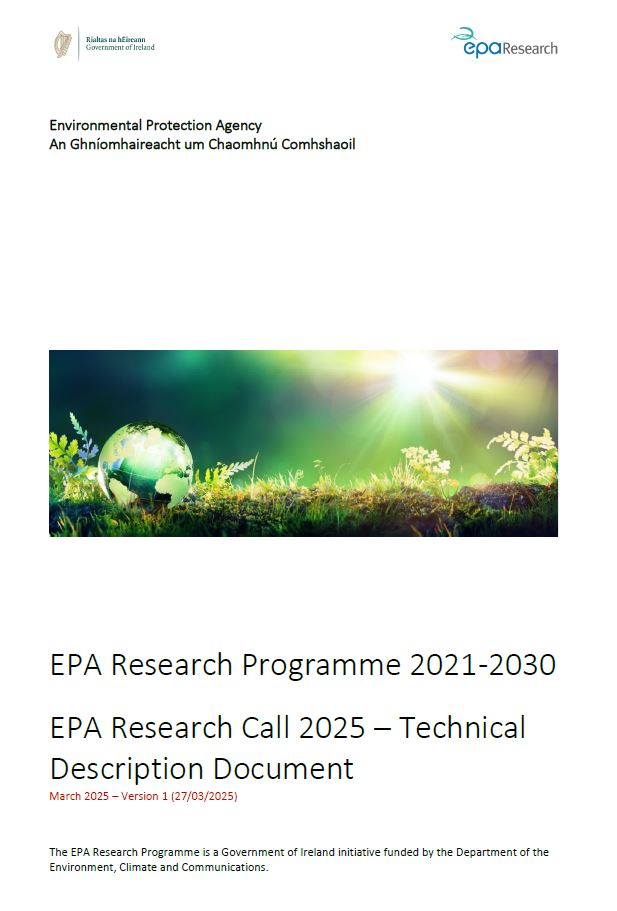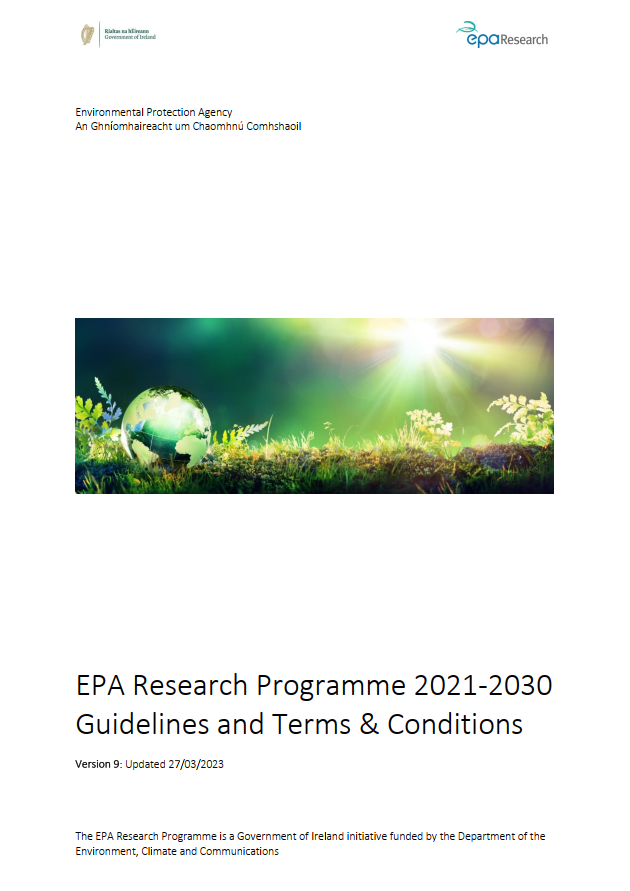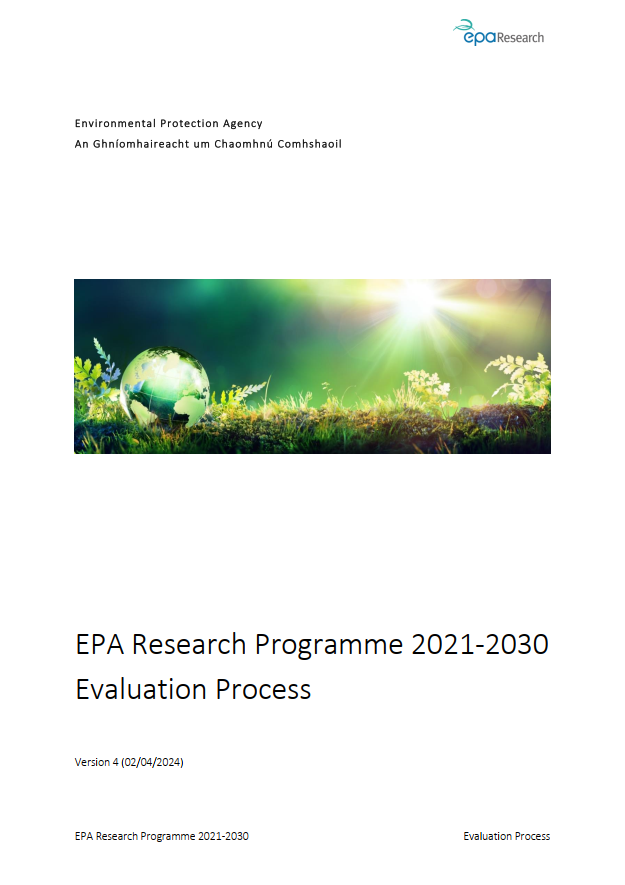Latest Publications
FOI Disclosure Log January to March 2025
Details of non-personal requests received under the Freedom of Information Act 2014 , April 2025
Year: 2025
Details of non-personal requests received under the Freedom of Information Act 2014, published on a quarterly basis.

Research 485: Specific Management and Robust Targeting of Riparian Buffer Zones
Authors: Daire Ó hUallacháin, Per-Erik Mellander, Simon Parker, Nikki Baggaley, Mark E. Wilkinson, Allan Lilly and Marc Stutter, April 2025
Year: 2025
With many of Irelands surface waters classed as less than the minimum of “good ecological status” under the Water Framework Directive, this research project looked to support optimal targeting and management of riparian margins, in agricultural contexts, for effective management of rivers in Ireland. It delivers a riparian measures database summarising alternative measures for Irish conditions, evaluating their effectiveness and wider ecosystem service benefits. Core to the research is the “Right Measure, Right Place” concept, a key tenet of Ireland’s River Basin Management Plan (2022–2027). Tools were developed to identify locations for maximum impact, using landscape context to prioritise 16 identified mitigation measures. The project aims to help policymakers and other research projects expand beyond traditional approaches to achieve water quality objectives under policies like the Common Agricultural Policy and Water Framework Directive.
Cigire/Oifigeach Eolaíochta III (Leibhéal 5) Ginearálta 000520
Uimhir phoist: 000520, April 2025
Year: 2025
Tá an EPA ag earcú chun ról an Chigire/Oifigeach Eolaíochta III (Leibhéal 5) a chomhlíonadh. Sannfar ról teicniúil don cheapaí a thuairisceoidh do bhainisteoir líne laistigh dá fhoireann sannta. Oibreoidh na hIarrthóirí Rathúla mar chuid d’fhoireann ghairmiúil ildisciplíneach agus foghlaimeoidh siad conas beartais an EPA a fhorbairt agus a chur i bhfeidhm maidir le feidhmeanna an réimse oibre a bhfuil siad sannta dó. Tá an EPA tiomanta don fhoghlaim agus don fhorbairt agus tá sraith tacaíochtaí ar fáil aici a chabhróidh leis na hiarrthóirí rathúla lena bhforbairt ghairmiúil.
Inspector/Scientific Officer III (Level 5) General
Post Number: 000520, April 2025
Year: 2025
The EPA is recruiting to fulfil the role of Inspector/Scientific Officer III (Level 5) General. The appointee will be assigned a technical role reporting to a line manager within their assigned team. Successful Candidates will work as part of a professional multi-disciplinary team and will learn how to develop and implement EPA policies in relation to the functions of the work area to which they are assigned. The EPA has a commitment to learning and development and has a suite of supports available which will assist the successful candidates with their professional development.

Hydrology Summary Bulletin - March 2025
Hydrology bulletin on rainfall, river flows, lake levels, groundwater levels and spring outflows for March 2025., April 2025
Year: 2025
Hydrology Summary Bulletin outlining the flows in rivers, rainfall, lake and turlough levels, groundwater levels and spring outflows of over 300 stations across Ireland for the month
Fee Reduction/Waiver Request Form
Year: 2025

Research 484: Framework for Characterising Oligotrophic (3110 and 3160) Lakes Using Practical Methods and Assessment Tools
Authors: Heather T. Lally, Martin Gammell, Emma Gray, Giovanni Cappelli and Cilian Roden, April 2025
Year: 2025
Oligotrophic lake habitats, which are characterised by low accumulation of dissolved nutrient salts are protected freshwater habitats in Ireland. These habitats support limited life forms, mainly algae and macroinvertebrates. This research report, from the "Peat Lakes" project, looks at the potential of these organisms to help in characterising and conserving oligotrophic lakes using practical methods and assessment tools. It assesses and provides findings on water chemistry and data from plant communities, including macrophytes, algal communities (including desmids), and invertebrate communities from 24 water bodies within Atlantic blanket bog landscapes in the west of Ireland. The report makes several recommendations and provides relevant stakeholders from state agencies with important information for the conservation of small water bodies (area ≤ 0.01 km²), to support the monitoring of favourable conservation conditions in oligotrophic lake habitats, under the EU Habitats Directive.
Access to EDEN and Water Abstraction Module
Year: 2025

Air Pollution Appeal - Lagan Tarmac Ltd - E0012-01
Year: 2025
These documents outline the decision made by the Environmental Protection Agency in relation to an Appeal regarding a decision made by Tipperary County Council (ref. AIR/L/05/01) to grant a licence under the Air Pollution Act 1987, as amended, to Lagan Tarmac Ltd.
MoU with Health & Safety Authority
Year: 2025

Research 483: Just Resilience and Adaptation in Ireland (JustAdapt)
Authors: Stefano Ceolotto, Niall Farrell, Pranav Kakkar and Anita Vollmer, April 2025
Year: 2025
Both the impacts of climate change and the policy responses to mitigate emissions affect different sections of society in different ways. The JustAdapt research project is the first national-level study to consider socioeconomic vulnerability alongside climate change impacts at a local level in Ireland. It includes modelling extreme weather events to identify where climate impacts and socioeconomic vulnerability coincide, assessing local economic impacts of climate policies, and developing guidelines for incorporating nature-based solutions, equity and justice into climate policy decision-making. Overall, the research offers policymakers, planners, and stakeholders’ insights to design fair, effective, and sustainable climate adaptation policies and strategies, while considering socio-economic vulnerabilities and promoting nature-based solutions for a resilient future.
Oifigeach Eolaíochta I (Leibhéal 3) Aer Comhthimpeallach
Uimhir phoist: 000518, March 2025
Year: 2025
Comhlíonfaidh an t-iarrthóir rathúil ról Oifigeach Eolaíochta I (Leibhéal 3) Aer Comhthimpeallach. Líonfar folúntas láithreach i gCigireacht Réigiúnach an EPA i gCill Chainnigh, san Oifig um Chosaint Radaíochta agus Monatóireacht Timpeallachta. Áirítear ar an réimse oibre ginearálta monatóireacht aeir comhthimpeallach, bainistíocht sonraí agus samhaltú aeir. Féadfaidh obair allamuigh agus saotharlainne a bheith san áireamh sa ról.
Scientific Officer I (Level 3) Ambient Air
Post Number: 000518, March 2025
Year: 2025
The successful candidate will fulfil the role of Scientific Officer I (Level 3) Ambient Air. Immediate vacancy will be filled in the EPA Regional Inspectorate in Kilkenny, in the Office of Radiation Protection and Environmental Monitoring. The general area of work includes ambient air monitoring, data management and air modelling. The role may include field and laboratory work.
Advisory Committee Meeting 15th January 2025
Year: 2025
Advisory Committee Meeting 15th January 2025

Research 482: Mitigating Agricultural Impacts on Water Quality through Research and Knowledge Exchange
Authors: Mary Ryan, Cathal O’Donoghue, Denis O’Hora, Jenny McSharry, Pat Murphy, Noel Meehan, Karen Daly, Owen Fenton, Yuting Meng, Paula Cullen, Rossella Di Domenico, Thomas Moloney, LoriRae van Laren, Daniel Urban, Niall McLoughlin, Emma Byrne, Catherine Seale and Maura Farrell, March 2025
Year: 2025
This research report explores improving water quality affected by agricultural practices using a multi-disciplinary approach .It incorporated systems analysis of actors and incentives, spatial analysis on the effects of rural activity, analysis of factors impacting measure adoptions, and socio-economic and behavioural psychology studies to identify drivers of pro-environmental activity. Key findings highlight the necessity of localised solutions, the importance of farm advisors and local farming 'champions', collaboration among stakeholders, and providing knowledge and resources to farmers. It also finds that trust between advisors and farmers, upskilling advisors, and understanding the direct and indirect barriers to farm-level behaviour change are seen as crucial for fostering sustainable agricultural practices. The researchers highlights the importance of incentives and behavioural interventions to promote pro-environmental practices.


